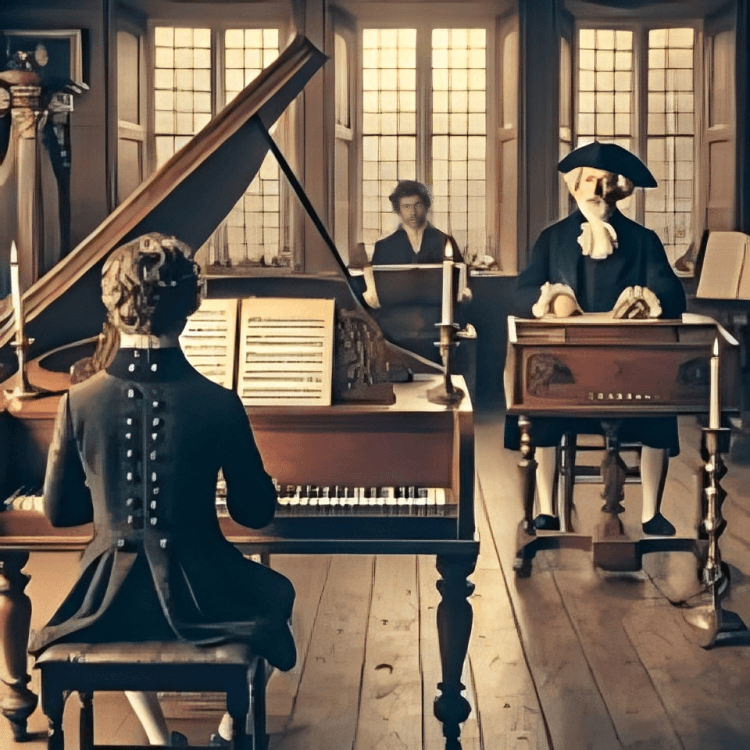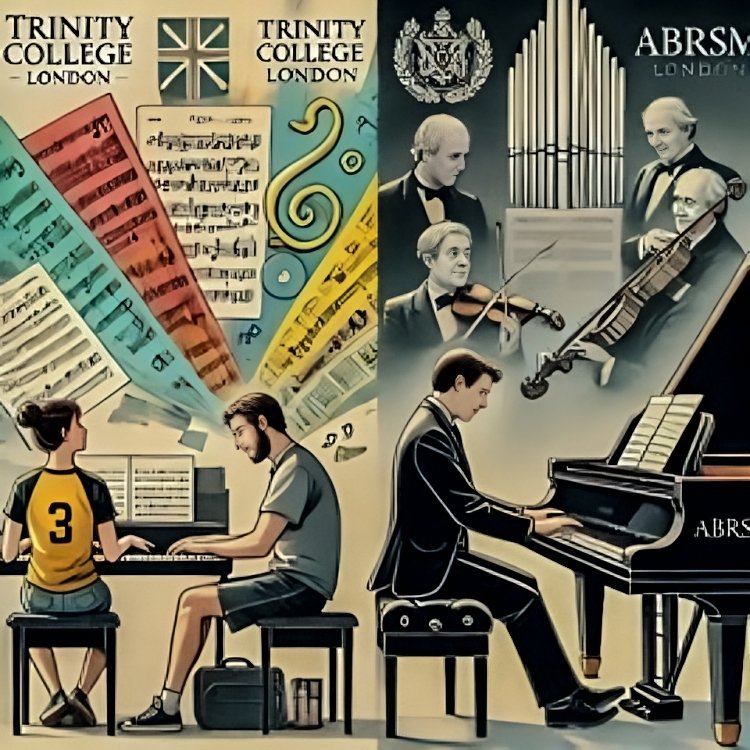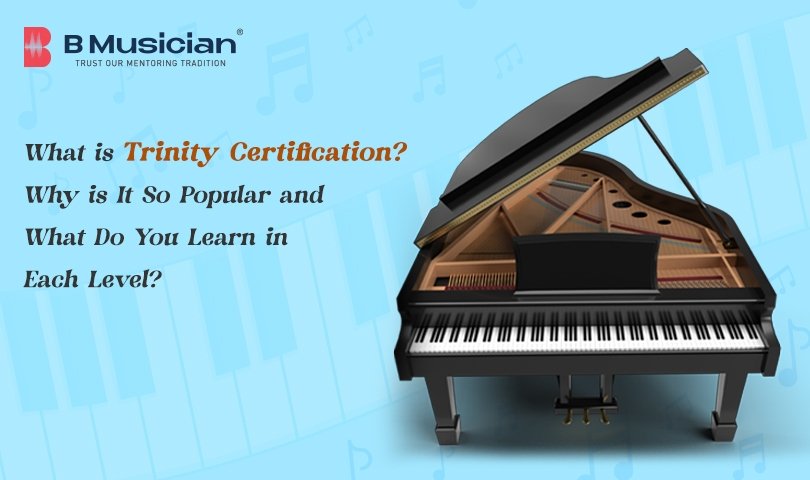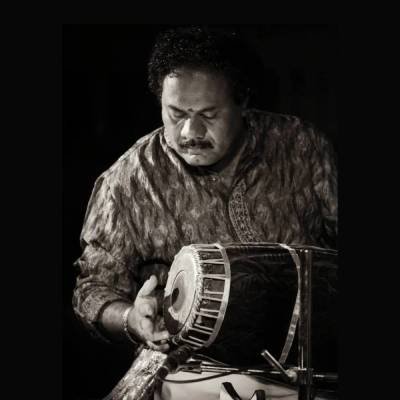Origin of Grade examination in Music
The idea of grade examinations in music developed in the 19th century, with the aim of creating a formal and standardised system for music education and assessment. Prior to this, music education was largely informal, with students learning from private tutors or family members. However, as the middle class expanded during the Industrial Revolution, the demand for structured education, including music, increased. Music began to be seen not only as an art form but also as an important social and cultural skill. This set the foundation for in person and online tutoring of music, piano, and other instruments where the institutions started training its students towards these standardised examination. Students sought out to Learn classical piano online, Trinity grade exams etc to advance their skill in their respective art.
The Early Foundation

History and Development of Music grade examination
19th Century:
- The mid-to-late 1800s saw the formal establishment of music grade exams in Europe, particularly in the UK. The ABRSM and Trinity College London led the way in creating a tiered system of exams designed to evaluate a student’s progress.
- ABRSM (Associated Board of the Royal Schools of Music): Established in 1889, ABRSM is one of the most recognised music exam boards worldwide. It was founded by four of the top music conservatories in the UK, with the purpose of setting consistent, high standards for music education.
- Trinity College London: Founded earlier in 1877, it initially offered exams primarily for piano students and later expanded to other instruments and disciplines. Trinity’s approach was slightly different, allowing for more flexibility in exam choices and repertoire.
20th Century:
- The 20th century saw the expansion of grade exams beyond Europe, particularly into Commonwealth countries. Both ABRSM and Trinity College London played a significant role in promoting music education in countries like India, Australia, New Zealand, and South Africa.
- As the music industry expanded to include more styles, grade exams began incorporating different musical genres, such as jazz and popular music, alongside the traditional classical framework.
Late 20th and 21st Century:
- The global reach of music exams continued to expand, with more students taking these exams worldwide. Digital technologies were also integrated, allowing for online registration, digital sheet music, and video-based exams in some regions.
- Newer institutions, like Rockschool (RSL Awards), were founded, which offered grade exams focused on contemporary and popular music, such as rock, pop, and electronic music.
Types of Institutions Offering Grade Examinations
- Associated Board of the Royal Schools of Music (ABRSM): Offers a traditional classical syllabus across a wide range of instruments and music theory.
- Trinity College London: Provides a broad repertoire and more flexible exam options in classical, jazz, and contemporary music.
- London College of Music (LCM): Focuses on classical, jazz, and popular music, including musical theatre.
- Rock school (RSL Awards): Specialises in contemporary music genres such as rock, pop, and jazz.
- The Royal Conservatory of Music (RCM): Based in Canada, RCM offers a graded system for various instruments, emphasising classical training.
Need for Grade examinations in Music field
- Standardisation:
Before the establishment of formal exams, the quality of music education varied greatly. Grade exams provided a standardised way to assess the progress and skill level of students, ensuring that students across the board were meeting specific standards of competency.
- Progressive Learning:
Music education, especially for instruments, requires consistent, incremental learning. Grade exams provide a structured framework where students move through a hierarchy of skill levels, building on technical and theoretical knowledge in a systematic way.
- Assessment and Motivation:
The exams offer tangible goals for students, giving them something to work toward and motivating them to practice consistently. The awarding of certificates and recognition (pass, merit, distinction) encourages students to strive for excellence.
- Recognition and Certification:
Grades act as formal qualifications that are recognised internationally. For students considering a career in music, these certifications are valuable for securing positions, whether in teaching, performance, or further education.
- Encouragement of Musical Literacy:
Music exams emphasise not just practical performance, but also theoretical knowledge, sight-reading, and aural skills. This encourages well-rounded musicianship, ensuring students are not just performers, but also understand the fundamentals of music theory and composition.
- Professional Pathways:
Grade exams serve as stepping stones for students who wish to pursue professional qualifications in music, such as diplomas and degrees. They also provide a standardised method for entry into conservatories and higher institutions of music learning.
Different Types of Grade examinations in music field
- Instrumental and Vocal Examinations: These are graded exams for specific instruments (piano, violin, guitar, etc.) or voice, and they assess the performance of repertoire, technical exercises (such as scales and arpeggios), sight-reading, and aural skills.
- Theory Examinations: Music theory exams focus on a candidate’s understanding of notation, harmony, structure, rhythm, and the history of music. These exams are crucial for musicians who want a deeper understanding of how music works.

- Performance Diplomas: These are advanced qualifications beyond the grade system and are offered by institutions like ABRSM and Trinity College London. They are designed for musicians seeking professional-level recognition in performance or teaching.
- Specialist Examinations: There are exams designed for specific genres, such as jazz, or exams focusing on specific skills like composition and improvisation.
- Group and Ensemble Exams: Some examination boards also offer graded exams for ensembles, choirs, and orchestras. These exams focus on group performance and coordination, encouraging collaboration between musicians.
Piano’s role in Trinity Certification
- Piano as a Central Instrument: The piano is one of the most popular instruments for Trinity exams, primarily because it forms the foundation for many aspects of music education, such as understanding theory, harmony, and rhythm. Additionally, piano music ranges from classical to jazz, which offers students a broad spectrum of styles to explore.
-
Skill Development through Piano:
- Technical Mastery: The piano’s technical requirements are challenging but highly beneficial for developing dexterity, coordination, and timing. Candidates must perform a variety of technical exercises, such as scales, broken chords, and arpeggios.
- Versatility: The wide range of dynamics, articulation, and expression that the piano allows makes it a versatile instrument. The piano repertoire includes everything from Baroque to Contemporary, encouraging students to develop stylistic versatility.
- Musicianship: Learning the piano helps in understanding harmonic progressions, structure, and musical form, all of which are key to excelling in the theoretical and practical components of the examination.
- Repertoire: The Trinity piano syllabus offers a rich selection of pieces from different musical periods and styles. This includes classical, jazz, modern, and contemporary pieces. Candidates must choose from lists that are categorised by difficulty and style. Playing a variety of repertoire allows pianists to demonstrate technical control, stylistic understanding, and interpretative skills.
- Impact on Theoretical Knowledge: For students pursuing Trinity music theory exams, the piano is an excellent instrument for visualising and applying theoretical concepts such as harmony, counterpoint, and composition.
- Performance Skills: The performance-focused approach in Trinity exams means that pianists develop strong stage presence and confidence, which are critical for further musical pursuits and professional engagements.
Why the Piano is Important in Trinity Exams:
Foundation for Other Instruments: Mastery of the piano can enhance one’s understanding of other instruments due to its comprehensive range and ability to play both melody and harmony.
Musical Literacy: Pianists typically develop better music-reading skills because of the instrument’s use of both treble and bass clefs, allowing them to engage with more complex scores.
Creative Opportunities: Piano students in the Trinity system have the option to engage in improvisation and composition, which are vital for musical creativity and expression.
Trinity and ABRSM- what should you go for? - educate yourself
Key Benefits of Trinity College London:
| Aspect | Trinity College London | ABRSM |
|---|---|---|
| Grades Offered | Initial Grade to Grade 8 (plus Diplomas: ATCL, LTCL, FTCL) | Grades 1 to 8 (plus Diplomas: DipABRSM, LRSM, FRSM) |
| Instruments Covered | Wide range including piano, guitar, violin, voice, drums, and more | Similar wide range including piano, strings, brass, and voice |
| Repertoire Flexibility | More flexible with a broader choice of repertoire (classical, jazz, contemporary) | Classical-focused with a well-defined list of pieces to choose from |
| Exam Structure | Performance pieces, technical work, sight reading (optional), improvisation (optional), aural tests | Performance pieces, technical work (scales, arpeggios), sight reading, aural tests |
| Supporting Tests | Sight reading or improvisation (candidate can choose), aural tests | Sight reading and aural tests (both compulsory) |
| Theory Requirements | No compulsory theory exams for Grades 1-8 | Theory exam required for progression from Grade 5 to Grade 6 |
| Performance-focused | Strong focus on performance and choice of pieces | Balanced approach with emphasis on theory and technical work |
| Grading System | Pass, Merit, Distinction | Pass, Merit, Distinction |
| Diploma Levels | ATCL, LTCL, FTCL (Performance or Teaching) | DipABRSM, LRSM, FRSM (Performance, Teaching, or Direction) |
| Genre Coverage | Classical, Jazz, Popular music options available | Primarily Classical, with some Jazz syllabus |
| Exam Flexibility | Flexible exam scheduling and structure | Slightly more structured and traditional in approach |
| Benefits | Broad repertoire including contemporary and popular music, Flexibility in exam content, choosing between sight reading or improvising, more inclusion of modern music | Strong focus on classical music tradition, comprehensive training in both performance and theory, Emphasis on sight reading skills for more well-rounded musicianship. |
- Flexibility in exam content and scheduling.
- Allows candidates to focus on modern and contemporary music, in addition to classical.
- Strong emphasis on performance skills with optional improvisation.
Key Benefits of ABRSM:
- Classical tradition-focused, offering comprehensive training in both performance and theory.
- A well-rounded approach to building technical, sight-reading, and aural skills.
- Recognized worldwide for its rigorous and structured assessment system.
Bmusician and its Doors to accreditation
This makes Bmusician a sought after and time-tested platform for students to learn Piano lessons online, Appearing for Trinity exams and a lot more.


















